▶️ Press Play: An Interview with Violeta Garcia-Mendoza
"I really regret how my creativity became a casualty of academic achievement culture and people-pleasing"
Welcome to The Long Pause, a newsletter about being creative, being stuck, and what to do about it. I’m Erinn. I’m a writer and an artist in a long, long Pause.
Today’s post is part of the Press Play interview series, which asks creative folks to share the story of their Long Pause so we can all learn from each other and stop feeling like creative lives are supposed to be linear (LOL LOL LOL). Today, Violeta Garcia-Mendoza shares her experience of toxic academia as a catalyst for her own Pause, and how homeschooling her kids and engaging with other creative outlets helped lead her back to writing. Don’t miss her gorgeous nature photos, or her new book, Songs for the Land Bound, out this week! 💖
Explain yourself. Who are you, how do you identify as an artist / creative?
My name is Violeta and I’m a poet, teacher, and suburban wildlife photographer. I call western PA home, though with an asterisk, since I was born and partially raised in Madrid, Spain… but I’ve been just outside of Pittsburgh ever since and for a long time now, and I love it. I live with my husband, three teenagers, and our motley pack of rescue dogs on a small certified wildlife habitat.
I grew up as an only child who LOVED reading and lived a lot in my imagination, and, as a teenager, I fell in love with music and poring over lyrics and writing poems. That’s the art I loved when no one else was watching, and when I didn’t really care about impressing anyone. As an adult, I’ve done a lot of other kinds of writing and work that led me away from those beginnings, but the more I return to them, the happier and more myself I feel.
Right now, I spend a lot of time caring for other people and creatures and less time than I’d like writing, but I know the balance will change soon, as my youngest two kids graduate this next year. Though I started off as a traditional k-12 school teacher, I’ve been homeschooling my kids for a long time. For us, homeschooling has been a really great (if intense) experience, not only in individualizing education to the way each of my kids learns best, but also helping create a family culture and environment where creativity is always kind of humming through the house. That’s important to me even when I’m not writing.
You’re here because you’ve gone through a fallow period where you didn’t produce much work for an extended period. How did your Long Pause come about? How long did it last?
My Long Pause started after my first year in an MFA program, in late 2010. I was a candidate in fiction, working on a novel loosely based on my childhood growing up in Madrid in the 1980s, a project which was psychologically fraught and wrong for me even under the best of circumstances. But at the time I also had three kids under four, a part-time Spanish teaching job, a chronic health condition, and a recent traumatic death in my extended family, so they were not the best of circumstances. I had enrolled in the program because I thought it was a necessary step in becoming a “serious” writer (even though I had already been writing and publishing), and I chose fiction because I thought it was the most promising genre for “success.”
It was the wrong decision in so many ways: not the right fit of program, not the right genre, not the right time, and, most importantly, not motivated by the right spirit. But it took me longer than it should have to realize this because I was getting all of my work done, and getting the little gold stars I fed off of at the time…so I thought it was fine. At least my brain did; my body did not, and it let me know by screaming loudly enough that I (eventually) had to pay attention. Some health issues flared so severely that I made the decision to take a leave of absence from the program.
I still remember how excruciating writing that email was and how the program director wrote back that he was sorry to see me go because I was “one of the best writers in the program,” but none of my other professors or mentors even so much as sent me a line to see what was going on or how I was doing. These were people I had worked really hard for, and felt a developing closeness to, and it felt like such a disillusionment to think that they actually didn’t care about me as a whole person.
And as someone whose schooling to date had solidified my identity as a “good student,” I also felt like a huge failure for dropping out. I would never talk to anyone that way now, but I talked to myself like that at the time.
I really regret how my creativity became a casualty of academic achievement culture and people-pleasing in such a way that I let my choice to drop out of that MFA program rob me of my identity as a writer, even though it had long preceded it. I stayed in that slow-boil environment long enough that it compromised my health, wholeness, joy, and curiosity. I didn’t write for a almost a decade after that.
How did you feel while you were in your Long Pause? What helped you? What didn’t?
It’s hard to evaluate what helped and what didn’t. Some of the more negative coping strategies ended up leading to positive ones; they were all tangled up in each other, and felt very much part of the same process of rebuilding.
During the majority of those years, I tried really hard to act the part of someone who didn’t miss writing. And I didn’t miss writing as it had been during my MFA era, as it had become… but I did miss writing as it had been for the whole rest of my life prior to that: during my childhood, teenage years, and young adulthood—writing that had felt like an essential, imaginative, companionable process.
I felt disappointed, disillusioned, angry, adrift, lonely for myself, and frustrated that I had lost that creative expression, that I had made myself such an easy mark to let it get taken away from me… But for a long time, I tried really hard to gloss over or avoid those feelings.
I filled my days with parenting and teaching— two super effective time sucks!— and took up new hobbies that had nothing to do with writing. I lost touch with old friends and made new friends who had never known me as a writer. I didn’t talk about writing or go back and re-read my old work. I tried really hard to keep my eyes off of my scars.
BUT…I also did a lot of therapy and started on medication for anxiety and panic disorder, and though creativity wasn’t something that we explicitly focused on during my sessions, there was a carry-over. At the same time, my kids were getting older and blossoming into these interesting, curious, creative people, and since we were spending so much time together homeschooling, I wanted to be a role model not just as a parent and teacher, but also as an artist. I didn’t know exactly how to do that, but I knew it needed to involve opening myself back up, and/or going back to the artist I first was.
And then, almost at the ten year mark of my Long Pause, the pandemic happened. The world felt like it became so much smaller and in that way it took me back to the small world-ness I felt when I was growing up. Where the world was my family, animals, nature, books, music, and imagination. That was really clarifying and let me time-travel in a way that ended up being very healing for my creativity. It also brought me very authentically back to the container of poetry, since that ended up being the thing I most wanted to read and carry around in my head during that time, just like I had when I was a teenager.
Once I was back to the point of reading and writing enough that I wanted to dip back into seeking community, finding non-pretentious, non-competitive online writing workshops really helped me. I was able to meet other writers from a much more diverse cross-section of age, experience, and circumstance than I had encountered in my MFA program, and their examples of open-heartedness and creative persistence really nourished me.
You’ve hit Play again—tell me about the project that returned you to your work. How did the shift out of your Long Pause feel?
The individual poems I started writing in 2021 and onwards felt like they wanted to be a book. Not even a chapbook, a full-length collection. Birds and references to music kept showing up; the page count kept growing, and the poems kept amplifying against each other. Intentionally and unintentionally, everything I wrote kept spiraling around the themes of love and nature and creativity through the lenses of anxiety and wonder. Those poems ended up becoming Songs for the Land-Bound.
The process of writing and putting it together felt invigorating and peaceful at the same time. Like a good deep breath of cold air on a sweaty winter hike. That sense of oooh, this kind of rightness that you feel in your body…this project felt like that.
I mentioned the pandemic’s role in pressing play again, but though that created the opening, I think what ultimately made the difference was time and the slow accruing of healing and curiosity and joy-seeking as resistance. This is not an answer I would have liked while I was deep in my Pause because I have an impatient heart, but in retrospect, I think that was the case.
…what ultimately made the difference was time and the slow accruing of healing and curiosity and joy-seeking as resistance
Did you engage with other creative practices while you were blocked from your primary mode of expression?
The main creative practice I took up in the years I wasn’t writing was photography. I bought my first good camera with the money I made from publishing my debut short story. While writing (especially writing fiction in general and the project I had been working on in particular) had felt like being in my head too much, caught in a fictional but upper case True kind of tortured version of the past, photography was a great counterpoint because it taught me how to be present and still. Because I gravitated towards the genre of nature photography, it also gave me a great excuse to spend time outside and practice being in my body.
That led to the project of—with a lot of help and over a lot of years—turning our once very basic lawn into a certified wildlife habitat. We subtracted so much grass and added in so many plants and trees and rocks over different phases, and garden design became a new embodiment of imagination and shelter-making. It felt like something that could make the world even a tiny bit better for other creatures, and though I don’t think I’m an optimistic person by nature, that felt full of hopefulness.
I also went back to playing piano, which I hadn’t done for many many years (since being kicked out of lessons at sixteen, having been told that no amount of practice was going to make me any better), and that taught me about reclaiming things from “authorities.” Something new occurred to me that hadn’t occurred to me at the time: even if I wasn’t ever going to get to concert pianist level, so what? Wasn’t the fact that I liked playing reason enough to keep going? So I bought a great old piano on sale and started playing again as an act of stubborn resistance. I play almost every day now for fun and relaxation.
Define creativity– what do you feel are the necessary elements of creative work, or a creative life? How has this definition grown or changed as you moved through a Long Pause?
Creativity is an inside magic with outer manifestations. A creative life is one in which you are nourished by art, in which you engage in the practice of making art, and in which you care for your (mental, emotional, and physical) health holistically enough to retain the ability and desire to keep going. It’s not about “success” or “productivity.” It’s about presence and continuing action, about the wide process of living as a creative spirit.
I couldn’t have arrived at that definition without my Long Pause. And though I still wish I hadn’t had to go through it, the truth is in retrospect I can see that it was necessary, I learned and grew so much from those years, even though I wasn’t writing. I have so much compassion for anyone experiencing a Pause because it feels scary and bleak and uncertain, but there is an after to it— though your mileage might vary as far as when it comes—and if you hang on, it’s wiser.
Violeta Garcia-Mendoza is a Spanish-American poet, teacher, and suburban wildlife photographer. Her work has appeared in numerous literary journals, and in 2022, she received a grant from the Sustainable Arts Foundation. She is a member of the Madwomen in the Attic Writing Workshops at Carlow University. Violeta lives with her husband, children, and a pack of rescue dogs on a small certified wildlife habitat in western Pennsylvania. Songs for the Land-Bound (June Road Press, 2024) is her debut collection.
Further Links:
Violeta’s Songs for the Land-Bound is officially out on September 24th, and you can pre-order it through June Road Press or Asterism Books, if you haven’t already!
You can read more of Violeta’s writing, browse her nature photography, and keep up with her virtual book tour through her website or follow her on Instagram @violeta.garcia.mendoza.


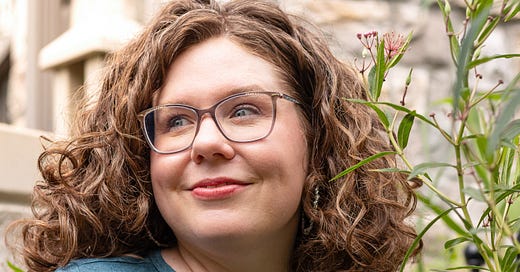



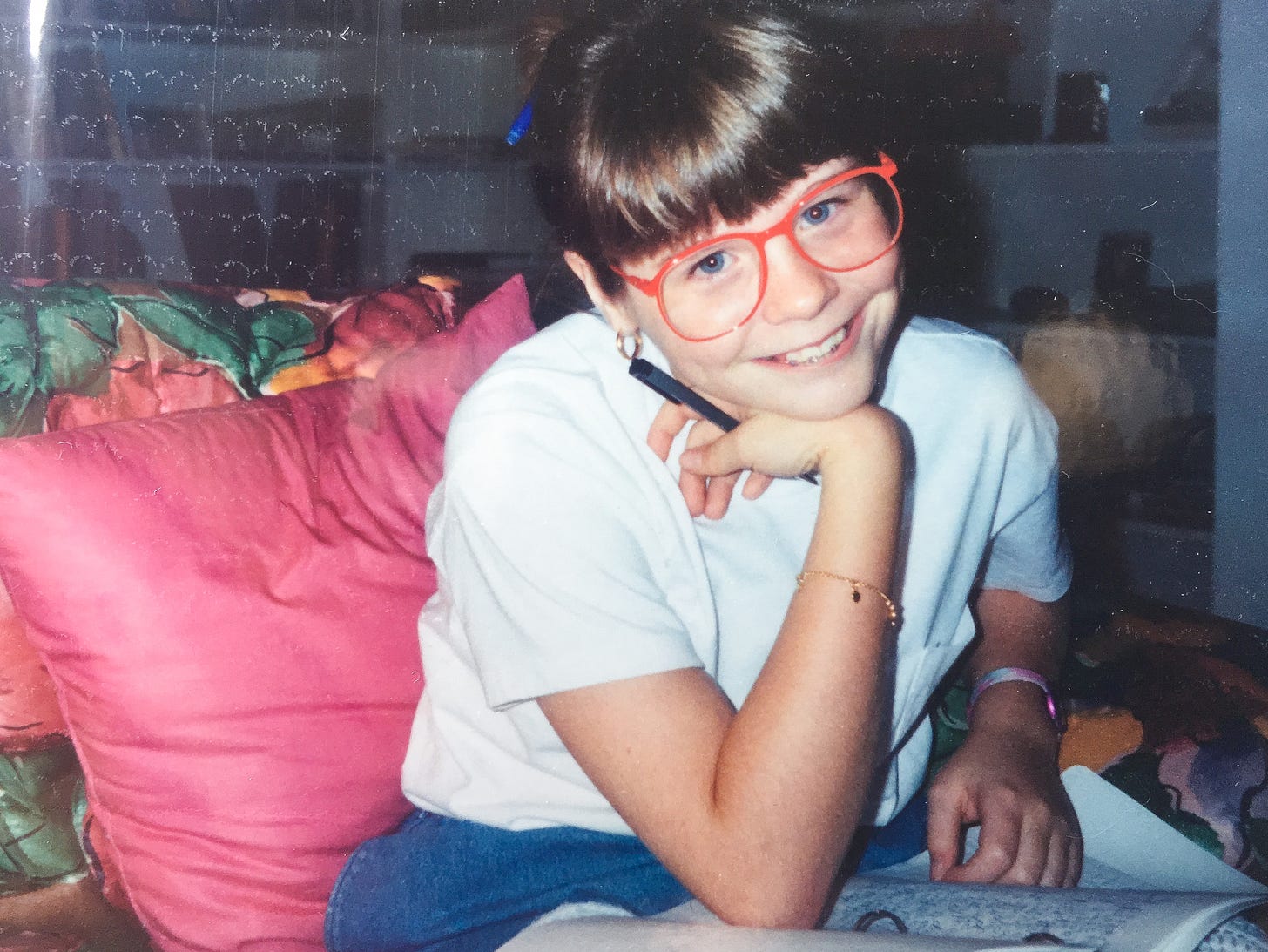
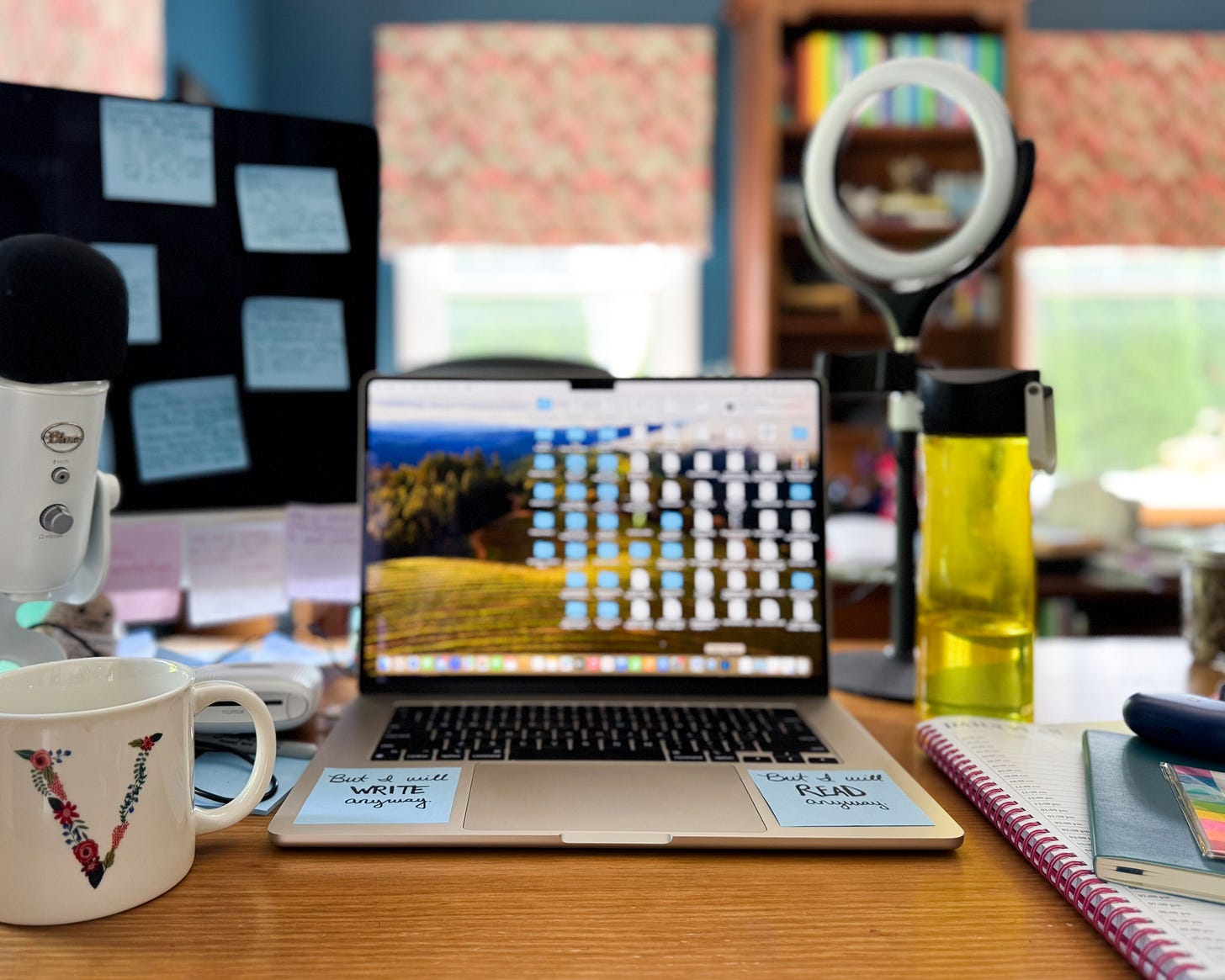
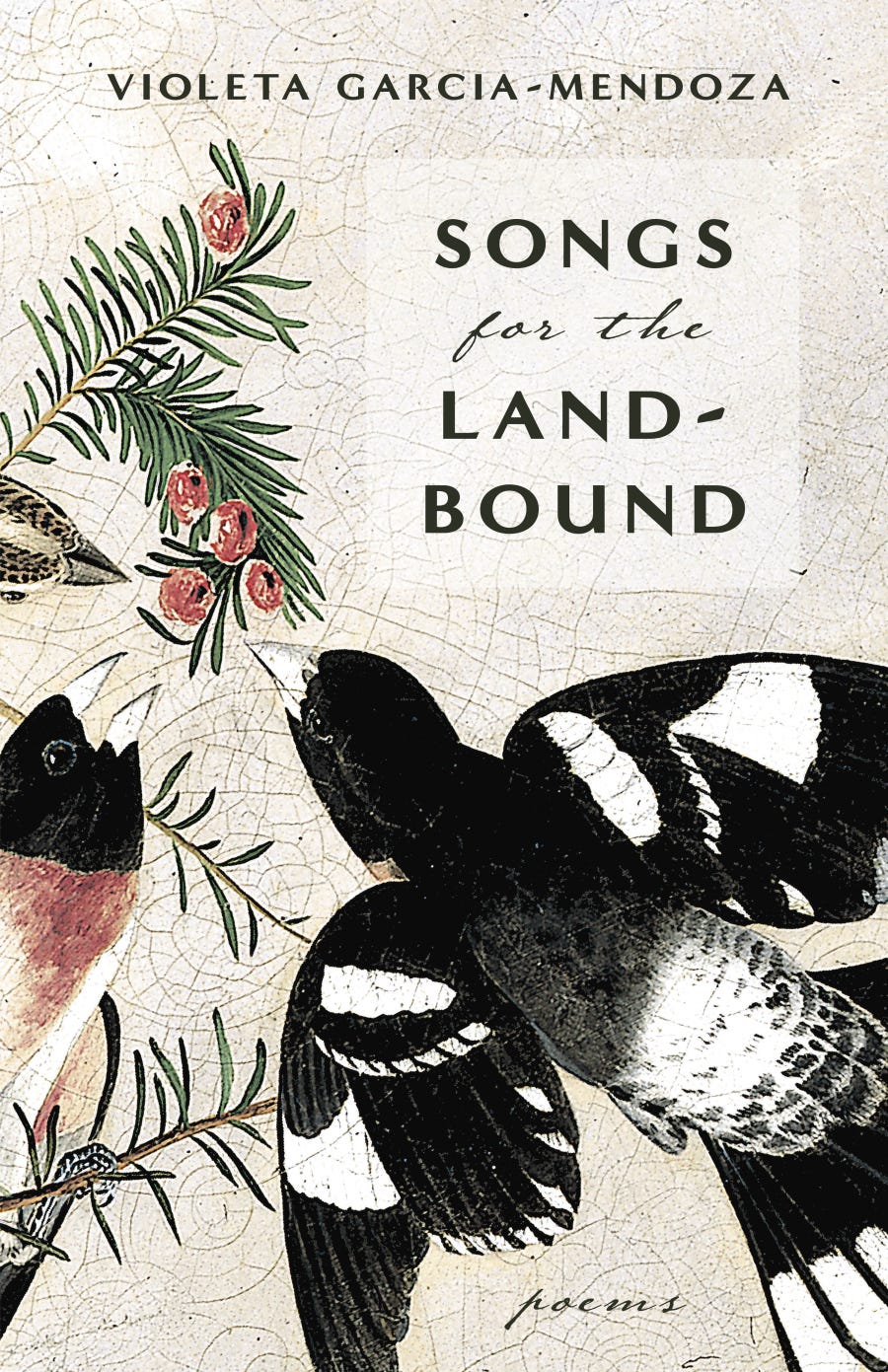
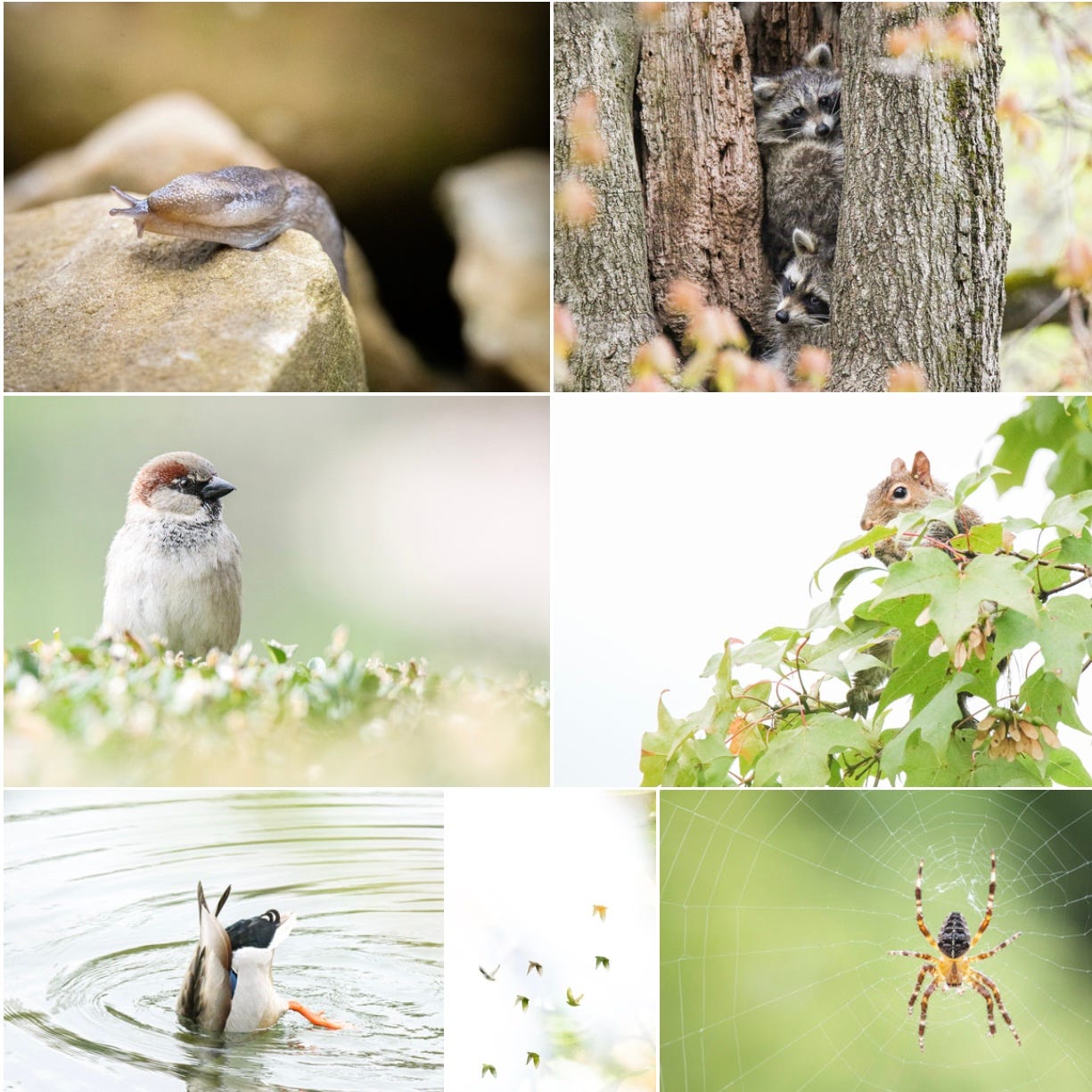

I love this definition of creativity! Especially as I sometimes struggle with the caring for your health part - I have to remind myself that sometimes I need to choose sleep or refilling the well over writing.
What a rich and wonderful set of insights. Thank you for sharing, Violeta! Erinn, this series breathes new life into me every time. Thank you!